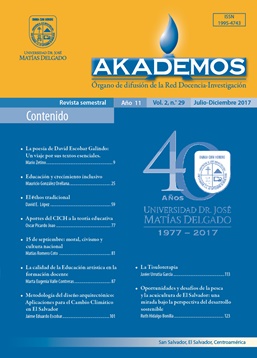El ēthos tradicional. Estudio sobre ética antigua. Artículo que fue ampliado en el conversatorio con el Mtr. Jaime Escalante
DOI:
https://doi.org/10.5377/akademos.v2i29.6320Palabras clave:
ēthos, éticaResumen
El concepto de ética antigua está ligado a una vertiente que viene de Sócrates (y los Sofistas), pasando por Platón, y que tiene su clímax en Aristóteles. En general, ninguna de estas teorías concibe la ética como un conjunto de consejos o normas sobre lo que los demás deben hacer. En este sentido, la ética antigua cumple una de las exigencias de Moore (1907), cuando afirma: “It is not the business of the ethical philosopher to give personal advice or exhortation”
A excepción de la ética de Aristóteles, la de Sócrates y de Platón están plagadas de lo que algunos estudiosos, como Guthrie (1984) han llamado intelectualismo ético, esto es, la idea de que la bondad moral está ligada a la sabiduría y, por ende, a la educación y que, por el contrario, la maldad moral es el producto de la ignorancia, de la ineducación o de la mala educación. El Estagirita, en cambio, se pregunta por cuál es el bien para el individuo y para la pólis, concluyendo que se trata de la eudaimonía o felicidad, la cual es el fn de la acción humana
Al respecto, ha sido ampliamente notado que Aristóteles no se pregunta por qué acciones debe realizar el individuo, tampoco da un conjunto de normas o consejos sobre lo que debemos hacer, sino que sencillamente se pregunta cuál es el bien que el individuo y la pólis deben buscar. Su repuesta es categórica: este supremo bien es la eudaimonía.
Aristóteles, no obstante, no es el primer pensador que aborda el problema ético. Antes de él lo hicieron Sócrates y los sofistas, y desde luego Platón. Pero a diferencia de ellos, Aristóteles lo hizo de manera sistemática.
Debido a lo anterior, en nuestro estudio de la ética antigua abordaremos algunos aspectos del pensamiento ético de Sócrates, bajo el supuesto de que sus ideas al respecto las encontramos en los así llamados diálogos juveniles o socráticos de Platón. Luego de ello, pasaremos directamente al pensamiento ético de Aristóteles.
AKADEMOS, Año 11, Vol. 2, No 29, Julio-Diciembre 2017: 59-75
Descargas
1866
Descargas
Publicado
Cómo citar
Número
Sección
Licencia
© 2016 Centro de Investigaciones en Ciencias y Humanidades, CICH.

